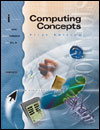Today people must process more information than ever before. Databases help organize this information and apply it in various situations. - Databases help promote democracy. Uganda created a registered voter database so each citizen uses only one voter ID card.
- Databases are helping U.S. politicians. A database containing information about 130 million registered voters has grown to 100 gigabytes.
- You don't have to be an expert to create an online database. Services provide databases you manage with Excel.
- A survey of more than 500 database developers found that a third are designing wireless or mobile device applications.
- Individuals and not businesses create most of the information. People create 500 times as much information with e-mail than all the Web pages in existence.
- The DNA project has more than ________ bits of data -- at least twice the contents of the U.S. Library of Congress.
The DNA project has more than a quintillion bits of data -- more than twice the contents of the U.S. Library of Congress. A quintillion is a trillion million. That's a number far beyond what any of us can imagine. The DNA project isn’t the only one amassing large amounts of data. The Internet Archive collects copies of all Web pages and stores the information in a large digital library. The Internet Archive has over 100 terabytes of Web pages alone. In contrast, all of the books and other information in the Library of Congress amount to only 20 terabytes of data. Your favorite radio station only has about 8 terabytes of data (15,000 hours of music). | 



 2002 McGraw-Hill Higher Education
2002 McGraw-Hill Higher Education


 2002 McGraw-Hill Higher Education
2002 McGraw-Hill Higher Education